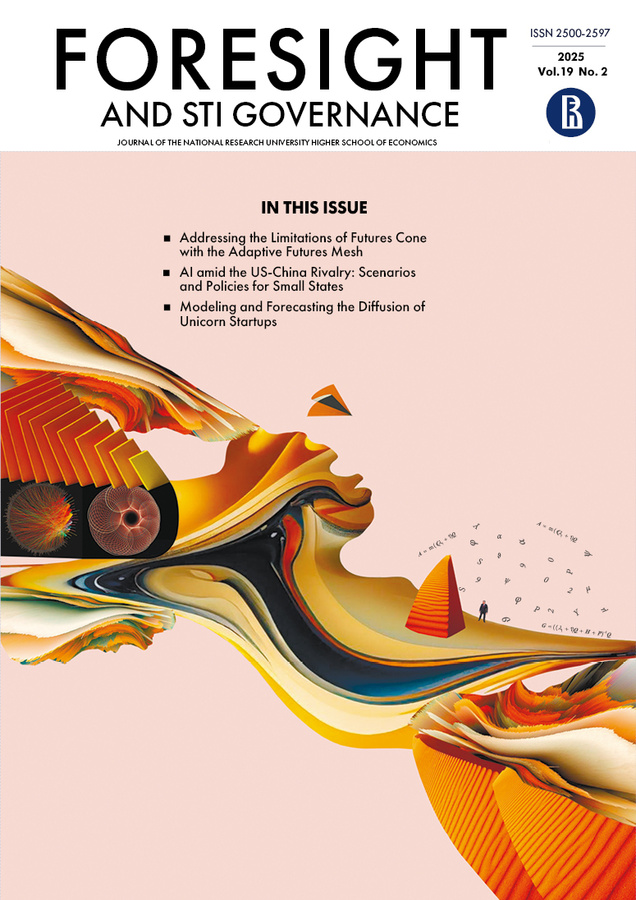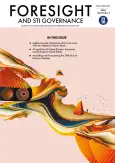Dynamic Capabilities: Towards Assessment of Futures Literacy Competency
- Authors: Gutarra Romero R.1, Valente Mercado A.G2, Ramírez Sirgo L.3
-
Affiliations:
- Континетальный университет
- Universidad Tecnológica del Perú
- Universidad Autónoma de Tamaulipas
- Issue: Vol 19, No 2 (2025)
- Pages: 86-97
- Section: MASTER CLASS
- URL: https://bakhtiniada.ru/1995-459X/article/view/307348
- DOI: https://doi.org/10.17323/fstig.2025.23756
- ID: 307348
Cite item
Abstract
In recent years, the topic of dynamic capabilities has acquired new content. As higher-order competencies, they allow one to constantly update oneself with new knowledge, flexibly recombine resources, and adapt to a rapidly changing environment. A key part of dynamic capabilities is working with the future, starting with basic skills - futures literacy (FL). Since this competence is key to the human resources of organizations, its development seems important, starting with university programs. For a long time, there were no objective tools for measuring the degree of their mastery. The authors of this article attempt to fill this problem by offering an innovative approach to identifying and standardizing the assessment of FL competence. Six theoretical dimensions of FL are proposed as a basis for grouping assessment criteria and compiling final assessments and their interpretation. The corresponding dimensions, such as FL sub-competencies that include foresight, the assessment of future scenarios, and decision-making under uncertainty, can be assessed independently of each other. The ability to measure the initial level of FL will allow for the development of more effective educational programs for the development of this competence.
About the authors
R. Gutarra Romero
Континетальный университет
Author for correspondence.
Email: roly.gutarra@gmail.com
A. G Valente Mercado
Universidad Tecnológica del Perú
Email: agvmercado@utp.edu.pe
L. Ramírez Sirgo
Universidad Autónoma de Tamaulipas
Email: luis.sirgo@uat.edu.mx
References
- Aaltonen M. (2009) Evaluation and Organization of Futures Research Methodology — Version 3.0. In: Futures Research Methodology — V3.0 (eds. J.C. Glenn, T.J. Gordon), Washington, D.C.: The Millennium Project.
- Ahvenainen M., Jokinen L., Korento K., Ollila J. (2015) Learning for the future - thinking ahead. Futura, 46–53, 2/2015 (in Finnish).
- Aiken L.R. (1985) Three coefficients for analyzing the reliability and validity of ratings. Educational and Psychological Measurement, 45(1), 131–142. https://doi.org/10.1177/0013164485451012
- Archer M.S. (2013) The reflexive imperative in late modernity, Cambridge: Cambridge University Press.
- Bartlett M.S. (1954) A Note on the Multiplying Factors for Various χ2 Approximations. Journal of the Royal Statistical Society Series B: Statistical Methodology, 16(2), 296–298. Available at: https://doi.org/10.1111/j.2517-6161.1954.tb00174.x
- Bell W. (2002) Foreword. In: Lessons for the future: The missing dimension in education (ed. D. Hicks), London: Routledge-Falmer, pp. 11–16.
- Bergheim S. (2022) On the Evaluation of Futures Literacy Laboratories, Frankfurt am Main: Center for Societal Progress.
- Bergheim S. (2024) On the Competence of Futures Literacy, Frankfurt am Main: Center for Societal Progress.
- Birkinshaw J., Lecuona R., Barwise P. (2016) The relevance gap in business school research: Which academic papers are cited in managerial bridge journals? Academy of Management Learning and Education, 15 (4), 686–702. https://doi.org/10.5465/amle.2015.0282
- Bloch E. (1995) The principle of hope (3 vols.), Cambridge, MA: The MIT Press.
- Burns A. (2015) Action Research. In: Handbook of Research in Second Language Teaching and Learning (ed. E. Hinkel), New York: Routledge, pp. 187–204.
- Costigan R.D., Brink K.E. (2015) Another perspective on MBA program alignment: An investigation of learning goals. Academy of Management Learning and Education, 14(2), 260–276. http://dx.doi.org/10.5465/amle.2013.0315
- Damhof L., Kazemier E., Gulmans J., Cremers P., Doornbos A., Beenen P. (2020) Anticipation for emergence: Defining, designing and refining futures literacy in higher education. In: Humanistic futures of learning: Perspectives from UNESCO Chairs and UNITWIN Networks (ed. S. Joseph), Paris: UNESCO, pp. 168–171.
- Doh J.P., Stumpf S.A. (2007) Executive education: A view from the top. Academy of Management Learning and Education, 6(3), 388–400. http://dx.doi.org/10.5465/AMLE.2007.26361628
- Ehlers U.D. (2020) Future Skills — Future Learning and Future Higher Education, Heidelberg, Dordrecht, London, New York: Springer.
- European Commission (2019) Key competences for lifelong learning, Brussels: European Commission.
- Facer K. (2016) Using the future in education: Creating space for openness, hope and creativity. In: The Palgrave international handbook of alternative education (eds. H. Lees, N. Noddings), London: Palgrave McMillan, pp. 63–78.
- Gidley J.M., Hampson G.P. (2005) The evolution of futures in school education. Futures, 37(4), 255–271. https://doi.org/10.1016/j.futures.2004.07.005
- Hair J.F., Babin B.J., Anderson R.E., Black W.C. (2019) Multivariate Data Analysis (8th ed.), England: Pearson Prentice.
- Inayatullah S. (2020) A castle surrounded by hungry wolves: Toward a stage theory of the uses of the future. World Futures Review, 12(1), 40–54.
- Kaiser H.F. (1974) An index of factorial simplicity. Psychometrika, 39(1), 31–36. https://doi.org/10.1007/BF02291575
- Karlsen J.E. (2021) Futures literacy in the loop. European Journal of Futures Research, 9(1), 17. https://doi.org/10.1186/s40309-021-00187-y
- Kazemier E.M., Damhof L., Gulmans J., Cremers P.H.M. (2021) Mastering futures literacy in higher education: An evaluation of learning outcomes and instructional design of a faculty development program. Futures, 132, 102814. https://doi.org/10.1016/j.futures.2021.102814
- Lalot F., Ahvenharju S., Minkkinen M., Wensing E. (2020) Aware of the Future?: Development and Validation of the Futures Consciousness Scale. European Journal of Psychological Assessment, 36(5), 874–888. http://dx.doi.org/10.1027/1015-5759/a000565
- Larsen N., Mortensen K.J., Miller R. (2020) What is Futures Literacy and why is it important?. https://medium.com/copenhageninstitute-for-futures-studies/what-is-futures-literacy-and-why-is-it-important-a27f24b983d8, дата обращения 19.11.2024
- Louie A. (2010) Robert Rosen’s Anticipatory Systems. Foresight, 12(3), 18–29. https://doi.org/10.1108/14636681011049848
- Mangnus A.C., Oomen J., Vervoort J.M., Hajer M.A. (2021) Futures literacy and the diversity of the future. Futures, 132, 102793. Available at: https://doi.org/10.1016/j.futures.2021.102793
- McChrystal S. (2019) Team of teams, New York: Penguin.
- Mezirow J. (1991) Transformative dimensions of adult learning, San Francisco: Jossey-Bass.
- Miller R. (2018) Transforming the Future. Anticipation in the 21st Century, London: Routledge.
- Miller R. (2007) Futures Literacy: A Hybrid Strategic Scenario Method. Futures, 39, 341–362. https://doi.org/10.1016/j.futures.2006.12.001
- Miller R. (2012) Anticipation: The discipline of uncertainty. In: The future of futures, Washington, D.C.: Association of Professional Futurists, pp. 39–43.
- Miller R. (2015) Learning, the future, and complexity. An essay on the emergence of futures literacy. European Journal of Education, 50 (4), 513–523. https://doi.org/10.1111/ejed.12157
- Moules J. (2020) FT Executive Education Rankings 2020: Analysis amid the Pandemic. Financial Times, 10.05.2020. https://www.ft.com/content/1c3f4b42-8172-11ea-b6e9-a94cffd1d9bf, дата обращения 10.12.2024
- Myllyniemi S. (2017) Youth Barometer 2016, Helsinki: Ministry of Education and Culture.
- Nadin M. (2012) Prolegomena — What Speaks in Favor of an Inquiry into Anticipatory Processes? In: Anticipatory systems: Philosophical, mathematical and methodological foundations (ed. R. Rosen), Heidelberg, Dordrecht, London, New York: Springer, pp. 19–60.
- Nelson C. (2019) Interview with Riel Miller by Clair Nelson. In: Human futures (ed. E. Overland), Washington, D.C.: World Futures Studies Federation, pp. 37–44.
- OECD (2018) The OECD Survey of Adult Skills is the jewel in the crown of its Programme for the International Assessment of Adult Competencies (PIAAC), Paris: OECD.
- OECD (2023) 21st Century competencies, Paris: OECD.
- Polak F. (1973) The Image of the Future, London: Elsevier.
- Poli R. (2013) A note on the difference between complicated and complex social systems. Cadmus, 2(1), 142–147.
- Poli R. (2017) Social time as a multidimensional category. World Futures Review, 9(1), 19–25.
- Poli R. (2019) Working with the future, Milan: Bocconi University Press.
- Poli R. (2021) The challenges of futures literacy. Futures, 132, 102800. https://doi.org/10.1016/j.futures.2021.102800
- Pouru-Mikkola L., Wilenius M. (2021) Building individual futures capacity through transformative futures learning. Futures, 132, 102804. https://doi.org/10.1016/j.futures.2021.102804
- Ramírez R., Rowland N.J., Spaniol M.J., White A. (2021) Avoiding the valley of death in educating strategists. Long Range Planning, 54(3), 102000. https://doi.org/10.1016/j.lrp.2020.102000
- Rogers M. (1998) Student responses to learning about futures. In: Futures education. World yearbook of education 1998 (eds. D. Hicks, R. Slaughter), London: Kogan Page, pp. 203–216.
- Rogers M., Tough A. (1996) Facing the future is not for wimps. Futures, 28(5), 491–496. https://doi.org/10.1016/0016-3287(96)00021-3
- Rosen R. (1991) Life itself: A comprehensive inquiry into the nature, origin, and fabrication of life, New York: Columbia University Press.
- Rubin A. (1998) The images of the future of young Finnish people, Turku: Publications of the Turku School of Economics and Business Administration.
- Schütz A. (1967) The Phenomenology of the Social World, Evanston, IL: Northwestern University Press.
- Siirila J., Laininen E., Tikkanen J., Salonen A.O., Pantsar T. (2018) Transformative learning in the Anthropocene era. Journal of Professional Education, 20(5), 39–56 (in Finnish).
- Spanjol J., Rosa A., Schirrmeister E., Dahl P., Domnik D., Lindner M., de la Cruz M., Kuhlmann J.F. (2023) The potential of futures literacy for impact-oriented business schools. Futures, 146. Available at: https://doi.org/10.1016/j.futures.2022.103084
- Sterling S. (2010) Transformative Learning and Sustainability: Sketching the Conceptual Ground. Learning and Teaching in Higher Education, 5, 17–33.
- Toffler A. (1970) The Future Shock, New York: Random House.
- Toivonen S., Rashidfarokhi A., Kyrö R. (2021) Empowering upcoming city developers with futures literacy. Futures, 129, 102734. https://doi.org/10.1016/j.futures.2021.102734
- Vygotsky L.S., Cole M., Jolm-Steiner V., Scribner S., Souberman E. (1978) Mind in Society: Development of Higher Psychological Processes, Cambridge, MA: Harvard University Press.
- Wals A E.J., Peters M.A. (2017) Flowers of resistance: Citizen science, ecological democracy and the transgressive education paradigm. In: Sustainability Science (1st ed.), New York: Routledge, pp. 29–52.
Supplementary files









